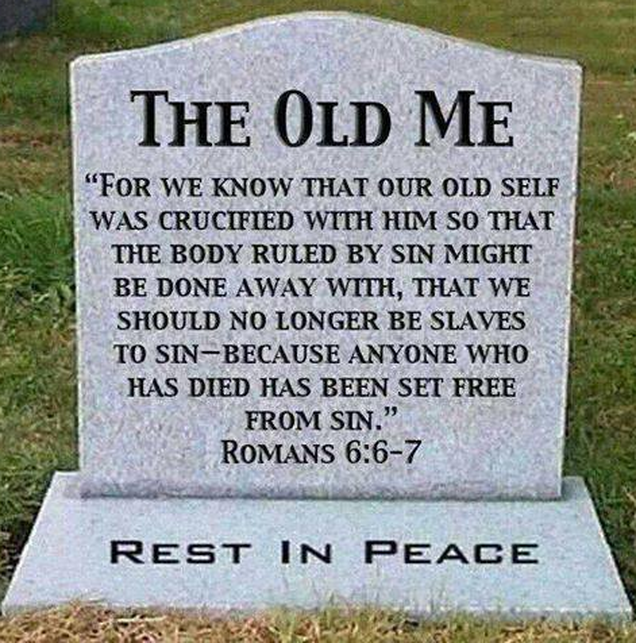Romans 6
|
Romans 6:1-2:
What shall we say then? Shall we continue in sin, that grace may abound? 2 God forbid. How shall we, that are dead to sin, live any longer therein? |

Paul begins this chapter by posing a question about the implications of the statements that ended chapter 5. There, he wrote that where sin increased, God's grace "super-increased." That is, as sin increased, so did God's grace abound to cover the sin of all those who trusted in Christ's death to cover their sin. We literally cannot out-sin the grace of God. [SOURCE: Bible Ref]
|
 Neil T Anderson
Neil T Anderson
What shall we say then? Shall we go on sinning so that grace may increase? By no means! We died to sin; how can we live in it any longer? (Rom 6:1-2).
You may be tempted to ask, How do I do that? How do I die to sin? We Can't, because we have already died to sin. The verb is past tense. We cannot do what has already been done for us by Christ. But I don't feel dead to sin, and frankly I am still sinning. Remember, it is not what we do that determines who we are. Just set your feelings aside for a few verse. Its what we believe that's going to set us free, not what we feel. God's Word is true whether we choose to believe it or not. Believing the Word of God doesn't make it true. His Word is true, therefore, we believe it. -Neil T Anderson; Overcoming Addictive Behavior; [c]2003
You may be tempted to ask, How do I do that? How do I die to sin? We Can't, because we have already died to sin. The verb is past tense. We cannot do what has already been done for us by Christ. But I don't feel dead to sin, and frankly I am still sinning. Remember, it is not what we do that determines who we are. Just set your feelings aside for a few verse. Its what we believe that's going to set us free, not what we feel. God's Word is true whether we choose to believe it or not. Believing the Word of God doesn't make it true. His Word is true, therefore, we believe it. -Neil T Anderson; Overcoming Addictive Behavior; [c]2003
 Brent Wright
Brent Wright
Ephesians 2:8 “For by grace you have been saved through faith, and that not of yourselves; it is the gift of God.”
By the grace of God we have been given salvation. Grace is a subject that could be discussed for days. I like to say that grace is “God’s riches at Christ expense.” This gift may be free to us, but it cost Jesus His life. We need to be careful however, because grace does not give us a license to continue to sin willfully. Romans 6:1 addresses this. “Shall we continue in sin that grace may abound?” Paul answers his own question in the next verse. “God forbid” or may it never be. That is pretty strong language. We have no right to keep on sinning, hoping that God will keep on forgiving us. --Brent Wright; North Broadway Church of Christ in Sidney, Ohio
By the grace of God we have been given salvation. Grace is a subject that could be discussed for days. I like to say that grace is “God’s riches at Christ expense.” This gift may be free to us, but it cost Jesus His life. We need to be careful however, because grace does not give us a license to continue to sin willfully. Romans 6:1 addresses this. “Shall we continue in sin that grace may abound?” Paul answers his own question in the next verse. “God forbid” or may it never be. That is pretty strong language. We have no right to keep on sinning, hoping that God will keep on forgiving us. --Brent Wright; North Broadway Church of Christ in Sidney, Ohio
|
Romans 6:3:
Know ye not. that so many of us were baptized into Jesus Christ were baptized into His death? |
Baptism is a gospel ordinance commemorating the death, burial, and resurrection of Christ. In baptism public testimony is given to the effect that the one baptized has been crucified with Christ, buried with Him, and is raised with Him to walk in newness of life. |
|
Romans 6:4:
Therefore we were buried with Him through baptism into death, that just as Christ was raised from the dead by the glory of the Father, even so we also should walk in newness of life. |
The day after Easter, the newspaper headline read: "Entire World Celebrates the Risen Christ." On the same page under smaller headings ran stories about war and death, racial clashes, and an ultimatum issued to the United States by a hostile nation. How contradictory. The headline declares that the entire world celebrates the risen Christ, but the balance of the page tells of people disregarding the blessing and grace Christ provided by His resurrection. Apparently the millions of people around the world who flock to churches on Easter don't all live as if they believe in the historical resurrection nor recognize its true spiritual significance. Even Christians can err in this way. Sometimes we simply go through the motions of expressing our faith without acknowledging our identification with Christ. In Romans 6, Paul said that we have been crucified with Christ and have died to sin. But we have also been raised with Christ so we can "walk in newness of life." That's why the apostle said, "If then you were raised with Christ Set your mind on things above, not on things on the earth" (Col. 3:1-2). Having been crucified with Christ, we are now privileged to live for Him. As we do, we show our gratitude for being "risen with Christ." |
 Wachman Nee
Wachman Nee
You believe in the death of the Lord Jesus and you believe in the death of the thieves with Him. Now what about your own death? Your crucifixion is more intimate than theirs. They were crucified at the same time as the Lord but on different crosses, whereas you were crucified on the selfsame cross as He, for you were in Him when He died. How can you know? You can know for the one sufficient reason that God said so. It does not depend on your feelings. If you feel that Christ has died, He has died; and if you do not feel that He has died, He had died. If you feel that you have died, you have died; and if you do not feel that you have died, you have nevertheless just as surely died. These are divine facts. That Christ has died is a fact, that the two thieves have died is a fact, and that you have died is a fact also. Let me tell you, You have died! You are done with! You are ruled out! The self you loathe is on the Cross of Christ. And "he that is dead is freed from sin" (Romans 6:7 Amplified). This is the Gospel for Christians.
Our crucifixion can never be made effective by will or by effort, but only by accepting what the Lord Jesus did on the Cross. Our eyes must be opened to see the finished work of Calvary. Some of you, prior to your salvation, may have tried to save yourselves. You read the Bible, prayed, went to church, gave alms. Then one day your eyes were opened and you saw that a full salvation had already been provided for you on the Cross. You just accepted that and thanked God, and peace and joy flowed into your heart. And now the good news is that sanctification is made possible for you on exactly the same basis as that initial salvation. You are offered deliverance from sin as no less a gift of God's grace than was the forgiveness of sins.
For God's way of deliverance is altogether different from man's way. Man's way is to try to suppress sin by seeking to overcome it; God's way is to remove the sinner. Many Christians mourn over their weakness, thinking that if only they were stronger all would be well. . . If we are preoccupied with the power of sin and with our inability to meet it, then we naturally conclude that to gain the victory over sin we must have more power. .
- Watchman Nee; Crucified Life
Our crucifixion can never be made effective by will or by effort, but only by accepting what the Lord Jesus did on the Cross. Our eyes must be opened to see the finished work of Calvary. Some of you, prior to your salvation, may have tried to save yourselves. You read the Bible, prayed, went to church, gave alms. Then one day your eyes were opened and you saw that a full salvation had already been provided for you on the Cross. You just accepted that and thanked God, and peace and joy flowed into your heart. And now the good news is that sanctification is made possible for you on exactly the same basis as that initial salvation. You are offered deliverance from sin as no less a gift of God's grace than was the forgiveness of sins.
For God's way of deliverance is altogether different from man's way. Man's way is to try to suppress sin by seeking to overcome it; God's way is to remove the sinner. Many Christians mourn over their weakness, thinking that if only they were stronger all would be well. . . If we are preoccupied with the power of sin and with our inability to meet it, then we naturally conclude that to gain the victory over sin we must have more power. .
- Watchman Nee; Crucified Life
“Knowing this, that our old man was crucified with Him, that the body of sin might be done away with, that we should no longer be slaves of sin.” Romans 6:6.
Paul writes as if this was something that was commonly known and believed: that the old man was crucified. Nowadays, this is quite unknown among Christians. Perhaps they know about it as dead knowledge, but they do not believe it, so it does not benefit them.
Recently someone testified that he now believed he was crucified with Christ, that it was an act of faith. He was overjoyed. It was wonderful to hear, because it was completely different from the old understanding: commit sin and receive grace to be forgiven. It is appropriate for a beginner to be excited about forgiveness, but when a person should have become a teacher in Christ and still continues to sin, that is lazy and deplorable. At some point we have to come to victory over all that we know to be sin, because conscious sin is of the old man. Then we gradually discover the sin which has been unconscious. As we receive light over unconscious sin, we will also crucify it. The body of sin will thereby be destroyed, and we will no longer serve sin.
By faith we keep sin in death where it belongs. We reckon ourselves to be dead indeed to sin, but alive to God in Christ Jesus our Lord. Sin must not reign in our mortal bodies, that we obey it in its lusts. (Romans 6:11-12)
We have lusts in our mortal body, but we must not obey them. In other words, we are dead to our lusts. We have received power to do this by taking this stand of faith: dead with Christ, crucified with Christ.
“I have been crucified with Christ; it is no longer I who live, but Christ lives in me.” Galatians 2:20. If Paul could believe that he was crucified with Christ, it must be possible for us too. That is why it is written as a fact: “And those who are Christ's have crucified the flesh with its passions and desires.” Galatians 5:24
Why live without victory then? Whining and complaining about continuous defeat sounds so humble, but the root of it is only sin and unbelief. The same spring cannot bring forth both fresh and bitter water. (James 3:10-11)
Standing at the foot of the cross is no help; it was not down at the foot of the cross that Jesus overcame. We have to get up on the cross. That is where Jesus overcame principalities and powers and all the hosts of hell. That is where we overcome too.
Priests and preachers should start teaching this to their disciples as soon as possible because it is a fact that only a very few believers have faith and a clear understanding of this matter—and it is a matter of life.
--“Crucified with Christ”; “Skjulte Skatter”; September 1935.
Paul writes as if this was something that was commonly known and believed: that the old man was crucified. Nowadays, this is quite unknown among Christians. Perhaps they know about it as dead knowledge, but they do not believe it, so it does not benefit them.
Recently someone testified that he now believed he was crucified with Christ, that it was an act of faith. He was overjoyed. It was wonderful to hear, because it was completely different from the old understanding: commit sin and receive grace to be forgiven. It is appropriate for a beginner to be excited about forgiveness, but when a person should have become a teacher in Christ and still continues to sin, that is lazy and deplorable. At some point we have to come to victory over all that we know to be sin, because conscious sin is of the old man. Then we gradually discover the sin which has been unconscious. As we receive light over unconscious sin, we will also crucify it. The body of sin will thereby be destroyed, and we will no longer serve sin.
By faith we keep sin in death where it belongs. We reckon ourselves to be dead indeed to sin, but alive to God in Christ Jesus our Lord. Sin must not reign in our mortal bodies, that we obey it in its lusts. (Romans 6:11-12)
We have lusts in our mortal body, but we must not obey them. In other words, we are dead to our lusts. We have received power to do this by taking this stand of faith: dead with Christ, crucified with Christ.
“I have been crucified with Christ; it is no longer I who live, but Christ lives in me.” Galatians 2:20. If Paul could believe that he was crucified with Christ, it must be possible for us too. That is why it is written as a fact: “And those who are Christ's have crucified the flesh with its passions and desires.” Galatians 5:24
Why live without victory then? Whining and complaining about continuous defeat sounds so humble, but the root of it is only sin and unbelief. The same spring cannot bring forth both fresh and bitter water. (James 3:10-11)
Standing at the foot of the cross is no help; it was not down at the foot of the cross that Jesus overcame. We have to get up on the cross. That is where Jesus overcame principalities and powers and all the hosts of hell. That is where we overcome too.
Priests and preachers should start teaching this to their disciples as soon as possible because it is a fact that only a very few believers have faith and a clear understanding of this matter—and it is a matter of life.
--“Crucified with Christ”; “Skjulte Skatter”; September 1935.
 Neil T Anderson Files
Neil T Anderson Files
"For now we know that our old self was crucified with him." (Rom 6:6). Are you still asking yourself, How do I do that? This is not something we can do. This is something we can only know and believe. This is a question of knowledge, not experience. The text does not declare: "For we must do." It is clear: "For we know." Many people try desperately to put the old self (Old man) to death, yet they fail. Why? Because the old self is already dead! We cannot do for ourselves what God has already done for us. So many people who fail in their Christian experience begin to reason, What must I have in order for this to be true? With this thinking, we will never see victory! The only experience that had to happened in order for this verse to be true occurred nearly 2,000 years ago on the Cross, and the only way we can enter into that experience today is by faith. We can't save ourselves, and we cant use human effort to overcome the penalty of death and the power of sin. Only God can do that for us--and He did."
-Neil T Anderson; Overcoming Addictive Behavior; [c]2003
-Neil T Anderson; Overcoming Addictive Behavior; [c]2003
Romans 6:11-13:
11 Likewise you also, reckon yourselves to be dead indeed to sin, but alive to God in Christ Jesus our Lord.
12 Therefore do not let sin reign in your mortal body, that you should obey it in its lusts.
13 And do not present your members as instruments of unrighteousness to sin, but present yourselves to God as being alive from the dead, and your members as instruments of righteousness to God.
11 Likewise you also, reckon yourselves to be dead indeed to sin, but alive to God in Christ Jesus our Lord.
12 Therefore do not let sin reign in your mortal body, that you should obey it in its lusts.
13 And do not present your members as instruments of unrighteousness to sin, but present yourselves to God as being alive from the dead, and your members as instruments of righteousness to God.
 Thomas Schreiner
Thomas Schreiner
1. Believers are no longer under the Mosaic covenant (Rom. 6:14–15; 7:5–6; Gal. 3:15–4:7; 2 Cor. 3:4–18). The commands stipulated in the Mosaic covenant are no longer in force for believers. Some appeal to the division between the civil, ceremonial, and moral law to support tithing. Yet these divisions, I would observe, are not the basis Paul uses when addressing how the law applies to us today. And even if we use these distinctions, tithing is clearly not part of the moral law. It’s true the moral norms of the Old Testament are still in force today, and we discern them from the law of Christ in the New Testament, but tithing is not among these commands.
 Robert G Lee
Robert G Lee
The destruction of sin is extensive. Sin abuses the body and makes that which should be the temple of the Holy Ghost, the temple of the Holy Ghost, the temple which the Devil uses. As the traders in the Temple at Jerusalem made God's house "a den of thieves," so sin makes the human body a den where iniquities find dwelling place and iniquities issue. As sin would pull God out of His throne, abusing His authority, His justice, His power, His wisdom, His patience, His mercy, His holiness, His promises, so sin would abuse all the powers and defile all the precincts of the human body.
--Robert G Lee; Yielded Bodies; 1954
--Robert G Lee; Yielded Bodies; 1954
 Ejikeme Ejim
Ejikeme Ejim
The transformed life is rooted in righteousness. Christ died to give us grace to live a righteous and holy life. It is not a cheap grace that makes people to live a defeated and sinful life. It is the transforming grace that gives you power to live above sin. It is the grace that purifies us within, makes us live a life that God Himself Has ordained. Christ did not die on the Cross of Calvary, went through all manner of torture on the cross, for us to live a sinful and shameful life. Jesus died to give us power to live above sin and also, that sin will not have dominion over us (Romans 6:14).
There is an ongoing battle for our bodies. Although, Jesus Christ has defeated the old slave master, sin, yet it continues to raise its head, attacking Christians. It tries to take hold of us, but we are not supposed to let it have power over us. Sin will have dominion over your life as much as you allow it, so, you must war against it — not let it reign over your mortal body. Paul says fight against sin and do not let it rule over your body (Romans 6:12). You cannot say you are ready for the rapture if you live in sin. The transformed life cannot allow sin to control his/her body or allow any part of his body to be tool of unrighteousness. -Ejikeme Ejim; April 2022
There is an ongoing battle for our bodies. Although, Jesus Christ has defeated the old slave master, sin, yet it continues to raise its head, attacking Christians. It tries to take hold of us, but we are not supposed to let it have power over us. Sin will have dominion over your life as much as you allow it, so, you must war against it — not let it reign over your mortal body. Paul says fight against sin and do not let it rule over your body (Romans 6:12). You cannot say you are ready for the rapture if you live in sin. The transformed life cannot allow sin to control his/her body or allow any part of his body to be tool of unrighteousness. -Ejikeme Ejim; April 2022
|
Romans 6:15-19:
What then? Shall we sin because we are not under law but under grace? Certainly not! 16 Do you not know that to whom you present yourselves slaves to obey, you are that one’s slaves whom you obey, whether of sin leading to death, or of obedience leading to righteousness? 17 But God be thanked that though you were slaves of sin, yet you obeyed from the heart that form of doctrine to which you were delivered. 18 And having been set free from sin, you became slaves of righteousness. 19 I speak in human terms because of the weakness of your flesh. For just as you presented your members as slaves of uncleanness, and of lawlessness leading to more lawlessness, so now present your members as slaves of righteousness for holiness. |
In humility, we remember that all Christians were once slaves of sin. Look at verse 17, “thanks be to God, that you who were once slaves of sin have become obedient from the heart.” Verse 18, “we have been set free.” This obviously means everyone, before the new birth, is a slave of sin. Everyone presents the members of their bodies as obedient slaves to the desires of the flesh. Verse 19 reminds us that we all once presented our members as slaves to impurity and to lawlessness leading to more lawlessness.” And why did we present our members as slaves to sin? We did it because it felt good, at least it felt good for a little while. Look over at Ephesians 4:17-19. These verses help us identify impurity, “Now this I say and testify in the Lord, that you must no longer walk as the Gentiles do, in the futility of their minds. They are darkened in their understanding, alienated from the life of God because of the ignorance that is in them, due to their hardness of heart. They have become callous and have given themselves up to sensuality, greedy to practice every kind of impurity.” Giving oneself up to sensuality is the same as presenting oneself as an obedient slave of sensuality. We simply want to feel good and so we try any and every slave master which offers a way to joy. Do this and you’ll be happy. Quit that and you’ll be happy. Buy this, win this, ditch this, and earn this and you’ll be happy. Desperately we present our members as obedient slaves of impurity and lawlessness which produces only more lawlessness as we try to be happy. The old adage is true: Sin always takes you further than you wanted to go and costs you more than you wanted to pay. Right now, in a sane moment when you are not at work trying to prove your worth or drown your sorrows, discern the end of your way of life. The end of these things is death (6:21). The wage you are earning is death (6:23). Polished in our Sunday best, we are still addicts willing to sacrifice everything but gaining only death. Be sober minded. --Paul Duncan |
 Steve Gallagher
Steve Gallagher
"Jesus said, "Truly, truly, I say to you, everyone who commits sins is the slave of sin." (John 8:34). Paul said, "Do you not know that when you present yourselves to someone as slaves for obedience, you are slaves of the one whom you obey, either of sin resulting in death, or of obedience resulting in righteousness.?" (Romans 6:16). Solomon wrote, "His own iniquities will capture the wicked, and he will be held with the cords of his sin." *Prov 5:22). And the Psalmist said, "There were those who dwelt in darkness and in the shadow of death, prisoners in misery and chains, because they had rebelled against the words of God, and spurned the counsel of the Most High (Psalms 107:10-11) --Steve Gallagher; At The Altar of Sexual Idolatry
|
Romans 6:20-22:
For when you were slaves of sin, you were free in regard to righteousness. 21 What fruit did you have then in the things of which you are now ashamed? For the end of those things is death. 22 But now having been set free from sin, and having become slaves of God, you have your fruit to holiness, and the end, everlasting life. |

In ancient Rome, slavery could pay wages. That is, slaves could earn a little money, either on the side or from their master. And if they were lucky, they might eventually buy their freedom. On the other hand, it was also possible for their master to give them the gift of freedom. Wages and gifts are two different economies, both in the world and in sanctification. -Shawn Lazar
|
 MR DeHaan
MR DeHaan
“You were not redeemed with corruptible things….but with the precious blood of Christ.” (1 Peter 1:18-19)
Among the many names given to our Lord in the Bible, one is especially dear to me. It is the name Redeemer. The word “redeem” literally means “to buy back.” It suggests that something has been sold or forfeited in order to pay a debt. When the price of its redemption has been paid, the lost article can be reclaimed. Man was created in God’s image, but he sold out to Satan for some fruit from a forbidden tree. Since that time, all mankind has been enslaved to sin and under judgment. The purchase price of redemption was the sacrificial death of Jesus Christ, which met the demands of God’s holiness. Everyone who accepts God’s gift of forgiveness is set free and becomes a slave of Christ the Redeemer (Romans 6:22). Many years ago, a man visited a slave market. He watched for a while, then bid on a slave until no one was able to go any higher. After paying the price, he gave the bill of sale to the slave, and said, “I have purchased you to set you free.” Overcome with gratitude, the slave refused to leave him and became his devoted servant for life. Jesus paid an enormous price for our salvation. Jesus gave his all for us -- are we giving our all for him? Do we serve Him out of gratitude? Let’s live free from sin in the grace of God! -Martin R DeHaan
Among the many names given to our Lord in the Bible, one is especially dear to me. It is the name Redeemer. The word “redeem” literally means “to buy back.” It suggests that something has been sold or forfeited in order to pay a debt. When the price of its redemption has been paid, the lost article can be reclaimed. Man was created in God’s image, but he sold out to Satan for some fruit from a forbidden tree. Since that time, all mankind has been enslaved to sin and under judgment. The purchase price of redemption was the sacrificial death of Jesus Christ, which met the demands of God’s holiness. Everyone who accepts God’s gift of forgiveness is set free and becomes a slave of Christ the Redeemer (Romans 6:22). Many years ago, a man visited a slave market. He watched for a while, then bid on a slave until no one was able to go any higher. After paying the price, he gave the bill of sale to the slave, and said, “I have purchased you to set you free.” Overcome with gratitude, the slave refused to leave him and became his devoted servant for life. Jesus paid an enormous price for our salvation. Jesus gave his all for us -- are we giving our all for him? Do we serve Him out of gratitude? Let’s live free from sin in the grace of God! -Martin R DeHaan
Paul uses the Greek word translated “fruit” as a metaphor for converts to Christ (e.g., Romans 1:13; Colossians 1:6) and for the expressions of a godly life (e.g., Romans 6:22, 7:4; Ephesians 5:9; Philippians 1:11; Colossians 1:10). John the Baptist also admonished his hearers to bear “good fruit” and Jesus himself taught the importance of producing “good fruit.” We could say, then, that the presence of the Spirit’s “fruit” is a telltale sign of a Christian. -William EW Robinson


















